No products in the cart.
Katha: Alternative education success story
Katha’s pioneer initiative of providing alternative education and skills training to 9.8 million slum children in Delhi NCR is recognised worldwide – Dilip Bobb
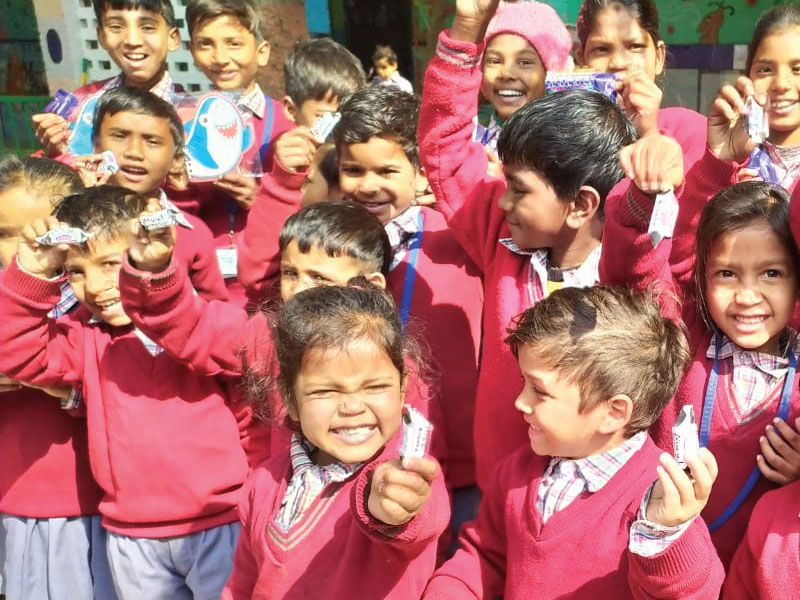
One week after the Covid-19 pandemic induced national lockdown was implemented in end March, Geeta Dharmarajan, founder of Delhi-based NGO Katha (estb.1988), wrote a children’s book titled The Mystery of the Missing Soap. This fictional story highlighted the message of personal hygiene. Within days, the book — and its message — went viral, and global. From Poland to Japan and the Middle East, The Mystery of the Missing Soap was downloaded on Kindle, recited on radio, enacted on television, and there’s even a feature film in the works. The international acclaim is merited because the story beautifully combines a parable for the unprecedented Covid-19 era with the allure of mystery narrative. This is the magic formula of all of Katha’s children’s books — they combine learning with — entertainment and a ‘Big Idea’.
Since she started Katha in 1988 with a magazine for children of underserved communities, Dharmarajan and her team, which has grown to 120, have realised impossible dreams, in most creative ways. The NGO is a major children’s books publisher (370 titles in English & Hindi, translated from 21 Indian languages); it also runs the Katha Lab School in Delhi’s Govindpuri slums, the Katha Slum Resurgence Initiative, Katha English Academy, Katha Information Technology and E-commerce School, Katha School of Entrepreneurship and a I Love Reading campaign — which together have positively impacted 9.8 million underprivileged children in the national capital region.
Katha’s pioneer initiative of providing alternative education and skills training to underprivileged children through its unique ‘storypedagogy’ and literature going back 2,500 years has been acknowledged and recognised worldwide. The 32-year-old NGO is recipient of the ICICI India Inclusive Award 2012; North India Winner of India NGO Awards 2009, and Katha’s I Love Reading programme was awarded the Millennium Alliance Award 2013 by USAID and government of India.
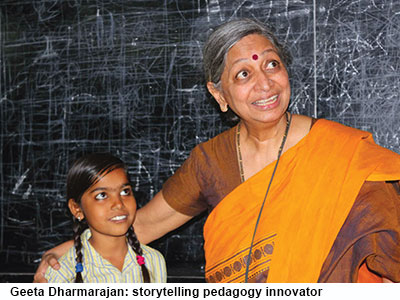 After imposition of the nationwide lockdown on March 25, Katha’s 120-strong team has continued its work of educating slum children by swiftly switching to online learning through apps such as Zoom, Skype and other video and audio platforms. “Since the lockdown, all our employees are working hard to keep our 50,000 children interested and involved in learning. Katha’s community development model is based on child welfare, education and literature, and on the idea that no Katha child shall live in poverty,” says Dharmarajan, an English literature alumna of Madras University and former assistant editor of the best-selling weekly India Today and the Penn Gazette (founded by Dr. Benjamin Franklin) of the University of Pennsylvania (1983-85).
After imposition of the nationwide lockdown on March 25, Katha’s 120-strong team has continued its work of educating slum children by swiftly switching to online learning through apps such as Zoom, Skype and other video and audio platforms. “Since the lockdown, all our employees are working hard to keep our 50,000 children interested and involved in learning. Katha’s community development model is based on child welfare, education and literature, and on the idea that no Katha child shall live in poverty,” says Dharmarajan, an English literature alumna of Madras University and former assistant editor of the best-selling weekly India Today and the Penn Gazette (founded by Dr. Benjamin Franklin) of the University of Pennsylvania (1983-85).
After returning to India, in 1987 Dharmarajan founded Tamasha, a Hindi language health awareness quarterly for slum children, with a Rs.5 lakh grant from Unicef. A year later, it morphed into Katha, a children’s publications NGO. “We publish enjoyable children’s books using our storytelling pedagogy in Hindi and English translated from 21 regional Indian languages,” says Dharmarajan, now based in Chennai.
Katha is, however, more than a children’s books publishing enterprise. Its multi-tasking is perhaps best described by Tim Walker, a British university student who spent his gap year in India including an internship stint with Katha. On his return to the UK, he wrote about his experience at the Katha Lab School and several government schools in India where this NGO implements its School Quality Enhancement Programme (SQEP). Writing in the influential London-based Independent (August 14, 2006), he says: “The Katha organisation has its own schools, welcome oases in the Delhi slums, reaching out to 7,000 underprivileged children across the sprawling capital. The pupils at the main Katha (Lab) school are given opportunities that many British schoolchildren would envy — a school newspaper, an impressively-equipped music room and recording studio; even filmmaking equipment. Katha (‘story’ in English) bases its educational approach on storytelling and also runs a publishing house, research and resource centre for children’s books and local writers — translating stories into English and Hindi from 21 regional Indian languages. Here, Gappers can take up an internship to become proofreaders, copywriters and researchers, even doing some creative writing of their own.”
Since inception, Katha has provided alternative education to 9.8 million children living in the slums of Delhi NCR, trained 20,000 government school teachers in ‘storypedagogy’ and has networked with 3,000 librarians to enhance the reading skills of more than 1 million children aged 5-17 years. With the passage of time Katha Lab School, promoted in 1990, has transformed into the Centre of Creativity for the Katha Relevant Education for All-Round Development (KREAD) and provides alternative education to 2,000 children living in eight slum clusters of Govindpuri.
The centre also hosts the Katha School of Entrepreneurship (KSE, estb.1995) and Katha Information Technology and E-commerce School (KITES, estb.2001). Promoted in 1995, KSE provides short-term courses certified by the Union ministry of human resource development and National Institute of Open Schooling in tailoring, dress design, bakery and food processing to 150 underprivileged youth annually. KITES, a joint initiative of Katha and British Telecom, provides year-long ICT skills training to batches of 300 youth residing in the Govindpuri slums. Thus far, KITES has trained 30,000 youth.
Katha’s child-centric initiatives are supplemented by community development programmes under which this innovative NGO runs income generation and skills training programmes for women residing in the proliferating slums of the national capital city. Every year, it presents its Dilli ki Shaan (Pride of Delhi) Awards to 15 women community leaders. The impact of Katha’s sustained Dilli ki Shaan women’s development programme has been huge. Over 450,000 women from 900 slums in Delhi have attained a sustainable degree of self-reliance. This, in turn, has led to them spreading greater awareness about issues such as sanitation, safe drinking water, housing and health in their communities.
Over the past three decades since Katha was launched as a modest children’s magazine designed to stimulate disadvantaged children to self-learn through reading, under Dharmarajan’s leadership this NGO has transformed into a broad-based non-formal education enterprise with an over-riding emphasis on preparing children and youth for gainful employment.
Among its alumni are civil service officers, engineers, teachers and skilled technicians and also Kamal Hussain, the son of parents who painted hoardings. Today, he is an accomplished artist and head of the art department of Shemrock International School, Gurgaon. Among Katha’s other initiatives are personality development workshops, simulated interviews and resumé writing sessions for children and youth. “It’s amazing how gutsy and gritty our children are. Given the opportunity, they can do wonders,” says Dharmarajan.
 To her credit over the past three decades, Dharmarajan has built a strong team which has increased its range activities and is continuing Katha’s good work now that Dharmarajan has relocated to Chennai to tend her aging parents. She now plays a creative and mentoring role with executive director Parvinder Kaur, discharging the CEO’s role. An English literature graduate of Delhi University, Kaur worked as a career counselor in Lucknow and Kanpur for several years prior to signing up as volunteer at the Katha Lab School (KLB) in 2000 to teach needy children English through the school’s unique storypedagogy, rising to the position of headmistress in 2010. Since then, the number of schools for low-income household children mentored by Katha has risen to 300 in Delhi NCR, and the NGO has also rolled out its I Love Reading initiative in schools and diversified into teacher training.
To her credit over the past three decades, Dharmarajan has built a strong team which has increased its range activities and is continuing Katha’s good work now that Dharmarajan has relocated to Chennai to tend her aging parents. She now plays a creative and mentoring role with executive director Parvinder Kaur, discharging the CEO’s role. An English literature graduate of Delhi University, Kaur worked as a career counselor in Lucknow and Kanpur for several years prior to signing up as volunteer at the Katha Lab School (KLB) in 2000 to teach needy children English through the school’s unique storypedagogy, rising to the position of headmistress in 2010. Since then, the number of schools for low-income household children mentored by Katha has risen to 300 in Delhi NCR, and the NGO has also rolled out its I Love Reading initiative in schools and diversified into teacher training.
According to Kaur, although the lockdown of schools has disrupted KLB, learning hasn’t stopped. “Everything has shifted online or to social media. Even in slum households, one or both parents possess smartphones so we have formed WhatsApp groups to deliver teaching modules and related programmes for children. We have also created a reading app for them, and are using video aids to provide instructions on social distancing and hand washing techniques,” says Kaur, who adds that Katha has also groomed volunteers and mentors to help disadvantaged families access government food ration schemes and other relief programmes.
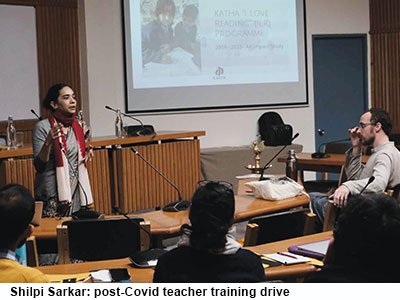 Katha’s top-level management also includes Shilpi Sarkar, director of the Katha Child Poverty Action Research Lab. A highly qualified sociology graduate of Presidency College, Calcutta and Purdue University (USA), Sarkar signed up with Katha in 2018 after running her own career and self-development projects in Kolkata. The lab manages projects and has researched several topics such as students motivation and school attendance, storypedagogy and happiness quotient of children, Katha’s community- owned and operated libraries (COOLs) in 39 slum habitations, Big Ideas in Katha’s children’s books, and ways and means to support and refine the I Love Reading programme. It also provides digital technologies management training to government school teachers. “We are training 1,000 government school teachers in Delhi NCR to keep Katha projects alive during the lockdown. We are training them to adapt to our projects’ technology-based platforms,” says Sarkar.
Katha’s top-level management also includes Shilpi Sarkar, director of the Katha Child Poverty Action Research Lab. A highly qualified sociology graduate of Presidency College, Calcutta and Purdue University (USA), Sarkar signed up with Katha in 2018 after running her own career and self-development projects in Kolkata. The lab manages projects and has researched several topics such as students motivation and school attendance, storypedagogy and happiness quotient of children, Katha’s community- owned and operated libraries (COOLs) in 39 slum habitations, Big Ideas in Katha’s children’s books, and ways and means to support and refine the I Love Reading programme. It also provides digital technologies management training to government school teachers. “We are training 1,000 government school teachers in Delhi NCR to keep Katha projects alive during the lockdown. We are training them to adapt to our projects’ technology-based platforms,” says Sarkar.
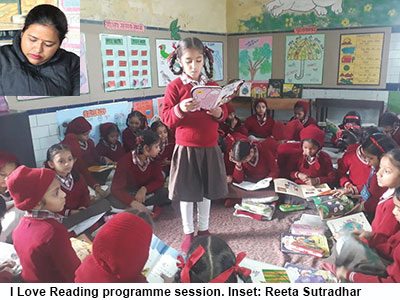 Reeta Sutradhar, an English and education postgrad of Delhi University who signed up with Katha in 2003 after several years of teaching in schools, is currently the NGO’s director (schools). Her portfolio is to train teachers in 300 municipal schools in Delhi, Haryana and Uttar Pradesh (Delhi NCR) and familiarise them with the storytelling pedagogy developed by Katha Lab School. She also heads this innovative NGO’s I Love Reading programme which has enthused over 1.4 million children in corporation schools to improve their reading and comprehension.
Reeta Sutradhar, an English and education postgrad of Delhi University who signed up with Katha in 2003 after several years of teaching in schools, is currently the NGO’s director (schools). Her portfolio is to train teachers in 300 municipal schools in Delhi, Haryana and Uttar Pradesh (Delhi NCR) and familiarise them with the storytelling pedagogy developed by Katha Lab School. She also heads this innovative NGO’s I Love Reading programme which has enthused over 1.4 million children in corporation schools to improve their reading and comprehension.
Post the Covid-19 lockdown, learning has moved online and Sutradhar is focused on educating the community about the pandemic. “Because most parents aren’t able to afford Internet data charges needed for live online classes, we are using recorded videos or WhatsApp to continue children’s learning. Once the situation improves and admissions start, the Katha Lab School will hold night classes to provide remedial learning to our children,” says Sutradhar.
To sustain its several initiatives, Katha is entirely dependent on donors and fundraising. Major donorpartners include the Australian High Commission, Ark UK, Ashoka Innovations, Aviva, Bank of Tokyo, British Asian Trust, Barrington Educational Initiative, BT Global India, CAF India, Commonwealth Girls’ Education Fund, Cians Analytics, DASRA, Deloitte, Essar, FICCI, German Embassy, HCL Foundation, HDFC Bank, HSBC, New Zealand High Commission, ONGC, Oracle, Raza Foundation, Rotary International, Sapient, Tata Communications, Tech Mahindra Foundation, Villigro, Worldreader, Yorkshire and Omidyar network.
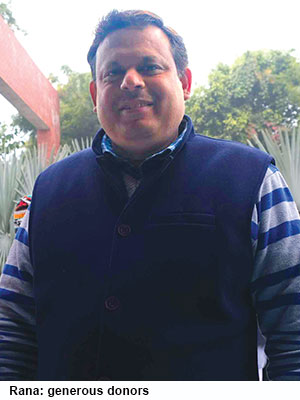 “Contrary to popular perception, Indian industry and offshore charities are forthcoming and generous in funding bona fide NGOs with good track records in education and community development. Our fundraising team of four which sends detailed annual reports to committed donor-partners and comprehensive plans to prospective donors, has always received good response,” says Anand Singh Rana, a physics postgrad of Kumaun University (Uttarakhand), who signed up with Katha in 2000 and is director, support services.
“Contrary to popular perception, Indian industry and offshore charities are forthcoming and generous in funding bona fide NGOs with good track records in education and community development. Our fundraising team of four which sends detailed annual reports to committed donor-partners and comprehensive plans to prospective donors, has always received good response,” says Anand Singh Rana, a physics postgrad of Kumaun University (Uttarakhand), who signed up with Katha in 2000 and is director, support services.
Although the prolonged closure of schools since mid-March has proved a setback for Katha’s numerous initiatives to disseminate the joy of reading and learning through alternative education, Dharmarajan is optimistic that it will quickly recover its momentum after the worst is over. “Work on one of our most ambitious projects to publish a GEEK (gender, equity, equality and kindness) volume which will feature 100 stories drawn from a treasure house of 2,500 narratives translated into Hindi and English from 27 regional languages is almost complete. Since printing and distribution of paper books is difficult because of lockdown restrictions, we will be loading an e-version in end July. Later, when schools reopen, we’ll publish the printed edition. Enabling children’s education through joy of learning is a continuous endeavour in Katha,” says Dharmarajan.
God speed!














Add comment